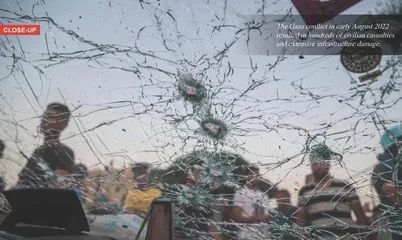International Security in 2022: Seeking Unity Amidst Fragmentation
作者: Meng Xiangqing

In 2022, the world went through once-in-a-century changes compounded with the Russia-Ukraine conflict, which have accelerated the evolution of the global security landscape. Interactions between the increasing traditional and non-traditional security threats led to more regional turbulence. Escalated great power competition and bloc confrontation have let us feel the atmosphere of a “sub-cold war”. Hegemonic, domineering and bullying acts were on the rise, peace deficit, development deficit, security deficit, and governance deficit were aggravated, and security issues became transnational, more closely linked and more diversified. The international community is troubled by more new sources of weakness, poverty and instability, and global security issues have become more prominent and prevalent, leading to a more complex and changing security landscape. Human society is facing unprecedented challenges.
The Russia-Ukraine conflict makes traditional security issues once again become the focus of attention of the world
This conflict brings great changes to Europe and beyond in 2022 and it will even have an influence in the 2020s. The root cause, however, is not the antagonism between Russia and Ukraine, but between Russia and the US. Its essence is not confrontation between Russia and Ukraine, but a tug-of-war between Russia and the US. It will not only influence Russia and Ukraine, but also the rest of the world. This conflict will definitely bring long-term and profound impact on international security.
From a military perspective, the conflict is a regional one. However, as it gradually evolves into a diplomatic war, a financial war, a technological war, a sanction war, an economic war, an energy war, and a battle for public opinion, all major countries have been involved. This conflict once again confirms that modern warfare has gone far beyond the military sphere, and that the era of direct military warfare between major powers is gone. Hybrid warfare and proxy wars waged through political, economic, diplomatic, financial, technological, public opinion and cultural means have become prevalent. Unlike the traditional ones, hybrid warfare leverages both military and non-military means, and both conventional and unconventional means. It is more adaptable and flexible. It can cleverly avoid the trap of triggering a nuclear war between major powers, and to some extent, even not be bound by moral codes and international law. Therefore, hybrid warfare is becoming a strategic tool of choice for great powers to shape favorable strategic positions, win strategic competitions, and even to subdue the enemy without fighting.
The Russia-Ukraine conflict has greatly impinged on world peace and intensified the fragmentation of the world into different blocs, making the international security increasingly fragile. In the next 5 to 10 years, acts that may destroy the existing international rules will create more contradictions, and the “butterfly effect” of the Russia-Ukraine conflict will definitely intensify volatility, division, restructuring and evolution of the international landscape. Biological warfare, cyber warfare, cognitive warfare, financial warfare, space warfare and other non-traditional forms of warfare will gradually envelop the world, and the possibility of breaking out a new world war has become increasingly high. Therefore, this conflict not only brings revolutionary changes to traditional warfare, but also promotes the reshaping of the international security landscape. Traditional security issues has once again risen to the focus of world attention after 30 years since the end of the Cold War and become topic of the year 2022.
Traditional and non-traditional security threats compound with each other
In the Russia-Ukraine conflict, antagonism between Russia and the US and its Western allies has been fully intensified, with the focus rising from regional security to the fight for and against hegemony. The global geopolitical and economic competition has reached an unprecedented height. To impose sanctions on Russia, the US has staked its own dominance and credibility to wage a comprehensive confrontation with Russia. The decoupling between the two sides is more drastic than that during the Cold War. The US-led NATO continues to expand into the north while taking the first opportunity to get involved in the Asia-Pacific affairs to build a global NATO. Western countries headed by the US have taken various measures to encircle Russia, and accelerated fierce competition with China by triggering new wars or creating economic traps.
Rounds of extreme sanctions imposed on Russia by the US and its Western allies have led to global inflation, energy crisis and serious food crisis. And the conflict itself has directly led to soaring global oil prices and inflation, intensified existing social conflicts, and created many other economic, energy-related, social and financial problems. Some countries have thus been dragged into political chaos. As the conflict escalates, food production in Ukraine is hampered and food exports to Russia meet difficulties. Global food supply is facing more uncertainties, and countries that are highly dependent on Russia and Ukraine for food imports are encountered with risks of food shortages and poverty.